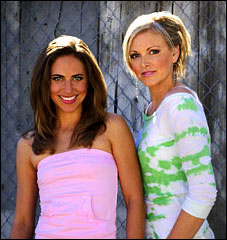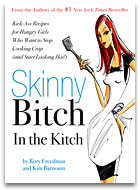It would be impossible to make it through an entire lunch with Rory Freedman without realizing this simple truth: The bitch loves food.
Excuse my language — or actually, don’t. Freedman wouldn’t say it any other way.

Rory Freedman (left), with coauthor Kim Barnouin.
Photo: Tim VanOrden
After all, she and former model Kim Barnouin are coauthors of the New York Times best seller Skinny Bitch — a title that only hints at the sassy writing style within: “You cannot keep eating the same shit and expect to get skinny,” the book opens. “Use your head, lose your ass” are its parting words. In between lies a health-food how-to extolling the virtues of an organic, animal-free existence — a vegan manifesto wrapped in sexy beach-read packaging. The duo’s recent recipe-based sequel Skinny Bitch in the Kitch doesn’t mince words either, offering vegan recipes ranging from “bitchin’ breakfasts” to “PMS (pissy mood snacks).”
Her cheeky writing aside, Freedman is serious about devoting her life to her two passions: food and animal rights. A one-time fast-food junkie and self-professed “pig,” Freedman says her relationship with food was forever (and for the better) changed when she attended a factory-farming convention with some friends. By the end of the weekend, she had made the decision to turn in her notice at her well-paying job as an agent for Ford Models and commit herself full-time as an animal-rights activist.
Freedman came to our lunch meeting with the same passion-driven impatience, having “pre-lunched” at one of the many vegan-friendly restaurants on her list of places to hit in Seattle. (Though the way she attacked her vegan Thai noodles, I wouldn’t have been the wiser.)
Between bites of our delicious, animal-friendly meal, we talked about the strides she and Barnouin have made in taking veganism from hippie to hip, the distance we’ve still got to go in addressing America’s disassociation with food, and the fact that we share her third passion: “I am a total dirty whore for reality TV,” she said. Ah, couldn’t have said it better myself.
Did you know from the very beginning that you wanted to write a vegan book without framing it that way?

Skinny Bitch in the Kitch, by Rory Freedman and Kim Barnouin.
Definitely. All the books that I had read had totally shaped my brain and I really wanted to get that information out there. But I also knew that those books didn’t find their way to me in a mainstream way. I found them when I was already involved in the animal-rights movement.
So [Kim and I] decided that we didn’t want to preach to the choir. We didn’t want vegans to read this book. We wanted people who would never in a million years stumble across information about slaughterhouses or factory farms or vegetarianism to read this book.
Have you found that to be true?
I think that a lot of vegans are reading it just because people are telling them there’s this awesome vegan book out there that you can lend your friends and family. People are always trying to convert their friends or family without much luck.
Of the 850,000 books that have been sold, I’d say the majority of them are not people who are already vegetarians or vegans.
Your first book got a big spike when Posh Spice was photographed with it. How do you feel about crediting her for some of your popularity?
We’ll take whatever we can get. There’s no shame in crediting Posh at all … We wrote the book because we wanted to change the world and we really wanted to get people to see what was going on with factory farming and animals. I don’t care how I have to do that; if Victoria Beckham gets that done, I’m nothing but grateful and thrilled.
What was it like working with a cookbook consultant for this second book?
Kim and I sat down first and said these are the kind of things that we want in this cookbook; we made a list of all these recipes that we wanted to include. Some of them were things that we had made before in our own kitchens on a regular basis … Other things were sort of a wish list that we came up with, like, “Gosh, now that I’m vegan I wish I could have blah, blah, blah, but I don’t know how to make it.” And that was where she came in.
Do you have a favorite recipe?
It’s hard to pick just one … But some of my favorites are the pecan-crusted French toast, the shepherd’s pie, the potato-chip peanut-butter cookies …
I also really like the steamed veggies in brown rice and tofu. It sounds so boring; it sounds like what typical vegans would be accused of eating, but I do love it and it tastes really good.
Do you cook often?
I love eating out — it’s my favorite thing to do, and it’s my favorite way to spend money — but I definitely wind up cooking more than I go out. I probably cook on an average of six to seven nights a week.
What have you been eating while you’re on your book tour?
I’ve been eating like a pig on this book tour because all the cities I’ve gone to are really veggie-friendly. So I’ve been hitting all the restaurants on my various lists.
I had fine dining in New York and here [in Seattle]. In Toronto, I went to a couple random little juice-bar type restaurants that have healthy sandwiches and rice bowls. Just kind of the same way I eat at home, really, like lots of fruits, lots of whole grains, lots of veggies, lots of fun vegan desserts. I’ve been drinking a lot of fresh juices on this trip, too, because of flying a lot and being run-down and tired.
You’re really not traveling to places that don’t have vegan options, but there are definitely parts of the country that are not as veg-friendly. What advice do you have for people who live —
Move! [Laughs.]
If someone does live in a place like that, they really just have to start asking their grocery store to carry better things. People think it’s such a big undertaking and that it’s so weird and strange to ask the manager of your grocery store, but it’s really not and they’re usually happy to oblige. If you want it, you’ve gotta ask.
Have you always had this passion for food?
I always pretty much loved food. My whole family is food-obsessed.
And you’ve converted your whole family.
My sister — I wouldn’t definitely call her a convert, but my parents are on board 100 percent.
That’s very cool.
It’s really cool. They’re in their 60s, and they’re not wishy-washy convertible people; they’re tough New Yorkers — or they’re Jerseyers now, but they grew up in New York.
There’s been a lot of talk lately about local vs. organic — and a lot of the pre-made vegan foods are coming from far away and a lot of carbon goes into the whole manufacturing process. How do you address that?
We don’t talk about that in the book as much as we talk about how eating meat and dairy products is so destructive on the environment. I think for a lot of people, it’s overwhelming to take on everything at once — to go from a standard American diet to somebody who’s entirely eco-friendly, and vegan, and shops local, and buys organic, and only does farmers’ markets. I think it’s a lot to ask — and it’s not to say that it shouldn’t be asked of them — but I think everyone needs to absolutely be doing the best that they can.
You say in Skinny Bitch that people shouldn’t necessarily trust the federal agencies regulating our food. Why should readers trust you?
They shouldn’t. One of the things we talk about is “trust no one.” Don’t believe us and put us on a pedestal because you like our book, or you saw us on the Today show, or because we’re on the New York Times best seller list.
We have to question everything that we learn. We have to find ways to validate our own ideas, our own beliefs, or beliefs that other people are presenting to us — or we have to invalidate them — but to just trust anything that anyone says is naive and irresponsible.
What’s the takeaway message of your books?
Be more attached and more conscious about what you’re putting in your mouth and what you’re putting in your body. If people do that, it will resolve a lot of their other eating problems and health problems, because once you’re really in tune with what you’re putting in your mouth and in your body, you start to make better choices.
These books are giving veganism a hipper image. How can we keep that momentum going?
It doesn’t have to be a big snoozefest when we talk about the environment, and that’s one of the things we talk about when we’re asked a lot “why the tone of the book?” Because we’re not doctors, we’re not scientists, we’re normal women — this is how we talk, and who says that a book about health or nutrition has to be boring? And it’s the same thing [with the environment]. Who says that information about the environment has to be boring and dry and clinical?
So I think that a way to keep environmental issues and animal-rights issues, or veganism, hip and current is to present them in a current way and to speak about them in our own language … If we just keep talking to our peers in our own voices instead of trying to package it in a way that maybe our conservative, right-wing, grown-up older generations may have appealed to, and just keep marketing to ourselves and to the youth, then we’re going to make changes. And I think we already are.
What else is on your plate for the future?
We’ve been trying to get our publisher to do two things all this time: One is a G-rated version of Skinny Bitch for people who are offended by the language and are missing out on the message. [The publishers] are not keen on it, but we’re going to keep working on them until we get a yes.
The other thing was a book for men. That was on our list all along, and … [the publishers] just literally made us the offer a few days ago. We’ve got to write it, but it’s going to be almost entirely the same as Skinny Bitch, just tweaked for men. And that’s going to come out December 2009.
And do you know what you’re going to call it?
I think it’ll be Skinny Bastard, but it’s too soon to say for sure.

